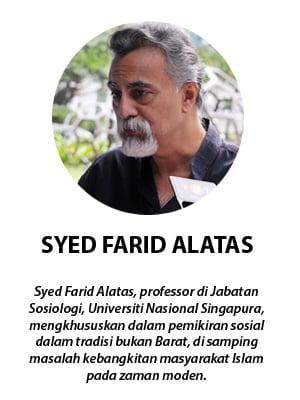Why was US academic
Bruce Gilley even invited?
Our universities have lost interest in the creative process of thinking originally.

It is not the fact of learning from Western knowledge that constitutes intellectual imperialism but the dependence on it coupled with the uncritical attitude and lack of originality that arises from this.
Such a mind is unable to distinguish between good and bad scholarship, and between rigorous and mediocre scholarship.
We then end up inviting someone like Bruce Gilley to teach us.
A few years ago, Gilley wrote an article titled “The Case for Colonialism” (Third World Quarterly, September 2017).
In it, he made a case for re-colonisation, which he argued would civilise post-colonial countries. Gilley was attempting to make colonialism something beneficial.
We are familiar with similar arguments made since the late 19th century by Zionists like Theodor Herzl, who claimed that it was the colonising European Jews who would bring civilisation to Palestine, not the Palestinians themselves.
Many of us in academia wondered how Gilley’s paper could pass the external peer review process of such a prestigious journal as the Third World Quarterly.
His point of view was not only objectionable but also based on mediocre scholarship.
Why would we want to be tutored by a person who is sympathetic to colonialism? Is this not demeaning?
An intellectually slavish mentality is not shamed by the fact that we are still heavily dependent on ideas on how to run a university that are hatched in American neoliberal institutions and that treat education as a business.
Hence the obsession with metrics and ranking. Our universities have lost interest in the creative process of thinking originally.
We simply rely on and are dependent on the research agenda, ideas and even the media of publication of predominantly American and British provenance.
This is what is meant by intellectual imperialism.
During the colonial period, British scholars, who were often colonial administrators at the same time, were not the best their society produced.
The colonial service tended to attract the more inferior talents. For example, while Britain had great scholars of British history, they had not produced great scholars of Malay history. In addition, such scholars were promoters of colonialism.
I see Gilley’s scholarship in these terms.
I am all open to discussion with any academic, but we must know which scholars we should honour with our invitations, and who we should critique or even avoid.
The ABC Romanised Malay, which made it much , much more widely accessible than the legacy Arabic Jawi Malay script , was very much the work of 19th Century English scholars , yup, working during British Colonial era.
ReplyDeleteYes, don't be dependent or beholden to the West, but rejecting Western intellectual thought, even ideas that Melayu Islam find objectionable is part of the Bawah Tempurung mentality.
Tempurung mentality?
DeleteSay that to yr mfering self!
Yr much admired England alphabets were the continuous EVOLUTION of pommie culture based on better &/or higher standard - aka Greek→Latin.
So no shake in the similar evolution of the jawi script to romanized form.
Western intellectualism is just a spurious form that those mfering western intellectual, picked & chose, to suit their own geopolitical & cultural thinking.
Nothing advanced or superior!